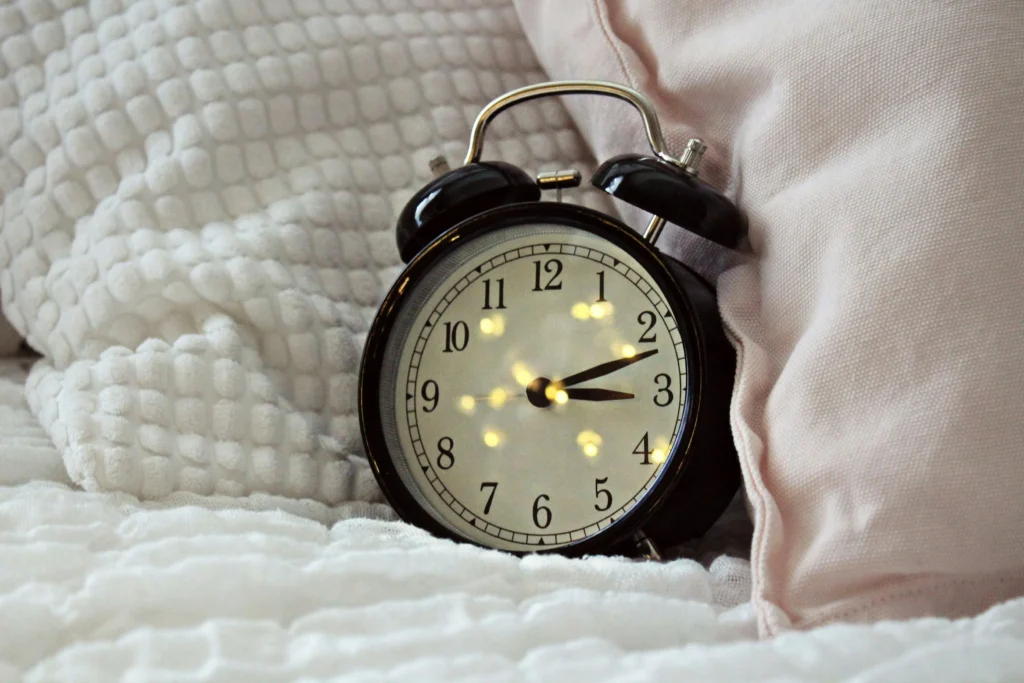Everyone talks about how important sleep is, but what about diabetes and sleep?

Sleep plays a key part in managing diabetes. This post covers the significant impacts of sleep and diabetes, including tips on enhancing your sleep hygiene.
Why Sleep Matters for Diabetes
Sleep offers several health benefits. Besides helping us rest and recover, sleep influences our blood sugar control and hunger-regulating hormones. When examining our overall health, it’s essential to consider our sleep hygiene in addition to nutrition and exercise.
Your body follows a circadian rhythm, a biological clock that controls physical and mental changes throughout the day. The circadian rhythm also impacts insulin secretion your body’s cells use insulin. Many factors, like sleep, food, and exercise, can impact the circadian rhythm positively or negatively.
Leptin and lack of sleep
Not getting enough sleep can cause hormone changes that directly impact your appetite. Leptin, a hormone that causes you to feel full after you eat, will decrease if you’re not getting enough sleep. Reduced leptin levels can make us feel hungrier, which may prompt overeating.
Ghrelin
Ghrelin, the hormone that increases hunger, will increase as we become more sleep deprived. In turn, our appetite increases. Our stress hormone, cortisol, increases too. The increase in cortisol will increase blood sugar levels.
If we aren’t getting enough sleep, our energy levels become imbalanced. To compensate for this energy imbalance, our body will signal us to eat more… which can impact blood sugar levels. Sleep deprivation impacts diabetes and blood sugar control, and increases the risk for cardiovascular disease in both Type 1 and Type 2 diabetes. A consistently adequate sleep schedule can prevent these risks from happening.

How much sleep is enough?
The National Sleep Foundation recommends:
- Toddlers: 11-14 hours
- Teenagers: 8-10 hours
- Adults: 7-9 hours
- Older adults (>= 65 years old): 7-8 hours
Research has shown that both too little and too much sleep can increase the risk of prediabetes and type 2 diabetes, and make existing diabetes more difficult to manage. 7-8 hours of sleep seems to be the weet spot.
Sleep Deprivation and Diabetes
Sleep deprivation may increase the risk of chronic diseases, including Type 2 diabetes. A week of consecutive sleep deprivation has been shown to result in significant changes to hormonal and metabolic functions. Sleep deprivation can decrease your body’s ability to use and store glucose by 40%. Research also supports that the increased risk of developing Type 2 diabetes is twice as much if you are consistently getting less than six hours of seep each night. As mentioned above, the general recommendations urge us to at least get seven hours of sleep.
Studies have shown that sleep disruption is associated with an increase in HgbA1C. And, insulin sensitivity can increase after just one night of not getting enough sleep. A connection between sleep deprivation, diabetes, and cardiovascular risk exists, too. The healthier our sleep is, the more our heart and metabolism are protected.
Although not fully understood, too much sleep (greater than 10 hours) also increases the risk of developing Type 2 diabetes. Excessive sleep can mean that someone is suffering from exhaustion, which can prevent their body from resting and recovering properly.

Common Sleep Challenges for People with Diabetes
Poor sleep quality is a common complaint from children and young adults with Type 1 diabetes. It’s also associated with a higher A1C level. Some reasons why sleep can be disrupted in someone with Type 1 diabetes include:
- Hypoglycemia: Low blood sugar can lead to erratic awake times throughout the night. Additionally, the fear and stress of having a low blood sugar overnight can reduce sleep quality. Plus, some people may experience difficulty with falling asleep after treating a low blood sugar.
- Hyperglycemia: High blood sugar can cause you to wake up in the middle of the night needing to use the restroom. For some people, myself included, it can make it difficult to fall asleep initially.
- Inefficient Sleep Structure: Our sleep occurs in stages that change from deep to light sleep. Some research shows young adults with Type 1 diabetes experience more light sleep than deep sleep, which can also impact blood sugar levels.
Common Sleep Disorders Associated with Diabetes
Sometimes, a sleep condition might just be the thing that is interfering with your sleep. Below are a few that are common, especially among those with diabetes.
- Obstructive Sleep Apnea: If you snore loudly or stop breathing in your sleep, you may likely have sleep apnea. Sleep apnea is more common in Type 2 diabetes and/or when blood sugars are not managed well.
- Restless Leg Syndrome: Restless leg syndrome causes a strong urge to move your legs due to itchiness, pulling, or other uncomfortable feelings. Nerve damage from diabetes can result in restless leg syndrome, which is also common in Type 2 diabetes.
- Insomnia: Difficulty falling asleep can be exacerbated by poor blood sugar management and vice versa.

Signs Your Sleep May Be Affecting Your Diabetes
Here are a few things to look for when assessing your sleep hygiene:
- Increased hunger
- High blood sugar levels
- High A1C after your next doctor’s appointment
- Falling asleep throughout the day
- Feeling tired more than usual. You can check out this previous blog for more information on fatigue.
Tips to Improve Sleep Hygiene with Diabetes
Although this is much easier said than done, below are a few tips to improve your sleep quality and duration.
- Stay away from your phone or any other technology for at least two hours before bedtime.
- Have a relaxing wind-down night routine. To signal your body to relax, you can journal, meditate, listen to music, or drink a hot cup of unsweetened tea before bed.
- Use an actual alarm clock instead of your phone. Some alarm clocks mimic the sunrise and offer relaxing sounds to wake up to.
- Consider getting a sleep study, especially if you are snoring or have periods of not breathing during the night.
- Exercise regularly. Physical activity can enhance our sleep and help manage blood sugar levels better.
- Revamp your insulin regimen as needed to prevent any nighttime low blood sugars. This is especially important when traveling. Read more in our travel blog post.
Implement these tips in your nightly routine to get the most out of your sleep!

References
- Circadian Rhythms. National Institute of General Medicine.
- An emerging connection between circadian rhythm disruption and type 2 diabetes mellitus. Mayo Clinic.
- National Sleep Foundation’s sleep time duration recommendations: methodology and results summary. National Sleep Foundation.
- The Interlinked Rising Epidemic of Insufficient Sleep and Diabetes Mellitus. Healthcare. 2019.
- Sleep and Metabolism: An Overview. International Journal of Endocrinology. 2010.
- Type 1 Diabetes and Sleep. Farabi SS. 2016





